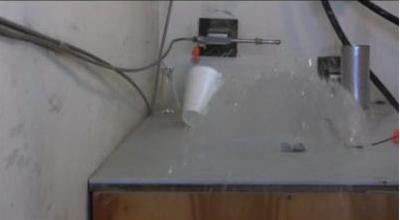Have terrorists obtained a new type of explosive? Researchers say that fears that terrorists are able to prepare a new and much more destructive form of the explosive responsible for increasing the security measures taken at airports regarding the shoes and luggage of passengers are not justified.

In a lecture given at the annual meeting of the American Chemical Society held in Salt Lake City, Utah by Dr. Gerard Harbison, computer simulation experiments are described to examine the range of capabilities of peroxide-based explosives from the chemical family of the known explosive Tri-acetone tri-peroxide (TATP). This powerful explosive, which can be easily prepared, was used by the terrorist Richard Reid in his failed attempt to blow up a passenger plane in 2001. This explosive is also used by Palestinian explosive terrorists in Israel.
The research team became interested in the subject following reports circulated on the Internet that claimed success in the creation of a new explosive - tetra-acetone tetra-peroxide (TeATeP) - which is supposed to be more lethal than TATP. At first, the research group worked on detection methods for superoxide explosives for the government institution called the Defense Advanced Research Projects Agency, and at some point, instead, began to examine the structure and nature of the new explosive and its likelihood of being used as a weapon in the hands of terrorists.
"Our tests show that new lethal substances in the hands of terrorists, which would overcome our detection threshold, should be too unstable for practical synthesis," says researcher Harbison, a chemist at the University of Nebraska. "We came to the general conclusion that it is unlikely that the previous syntheses were successful, and that the internet myth about TeATeP is nothing more than that. Hence, the good news is basically that this is a threat that there is no need to worry about."
The group examined the molecular structures of twenty different acetone peroxide compounds and found that it is likely that all substances heavier than TATP would be too sensitive to be used as a terrorist weapon. "The energies we measured in our tests were quite extreme," said the lead researcher, adding that a previous paper describing an earlier synthesis of TeATeP raised many questions for further clarification. "If you review the practical literature regarding people who have argued for the preparation of TeATeP, the issue is very controversial. We are convinced that what probably happened was that people who thought they created TeATeP actually created TATP."
"This synthetic error is widespread and sometimes even fatal, says the researcher. When trying to produce TATP, a less stable "relative" is sometimes formed - di-acetone di-peroxide. "The nice thing about computerized experiments lies in the fact that, firstly, it is safe, and secondly, that our results are so close to those measured in "wet" experiments that we are quite confident in what we are doing," said the researcher. "We are really at a stage where we are able to assess threats - possible compounds that could be dangerous - and we are really able to make some kind of informed and scientific judgment as to whether these substances may pose a future danger. We are able to examine questions using computers at a level of reliability that is very similar to the preparation of the material itself and its practical examination in the laboratory."
There is a lot of research that discusses existing threats, says the researcher. But this group's research focuses on the idea that new threats will always emerge. "Probably we would like to predict the threats before we encounter them in reality. We push it a little further now and discuss possible threats.
"Through the use of computational chemistry, we are able to reduce the scope of possible dangers, which are still far from reality. I believe that now we know much more about me not only what works in improvised explosive devices, used by terrorists, but also what does not work, and we do not need to try it in practice."

3 תגובות
Why not ? Rather, let them try to produce these unstable explosives. As the saying goes, "playing with fire will immediately be punished"
Can the computer calculate what should be done with terrorists?
The likelihood that terrorists will invent something is extremely low.
In total, they use means developed in the West.